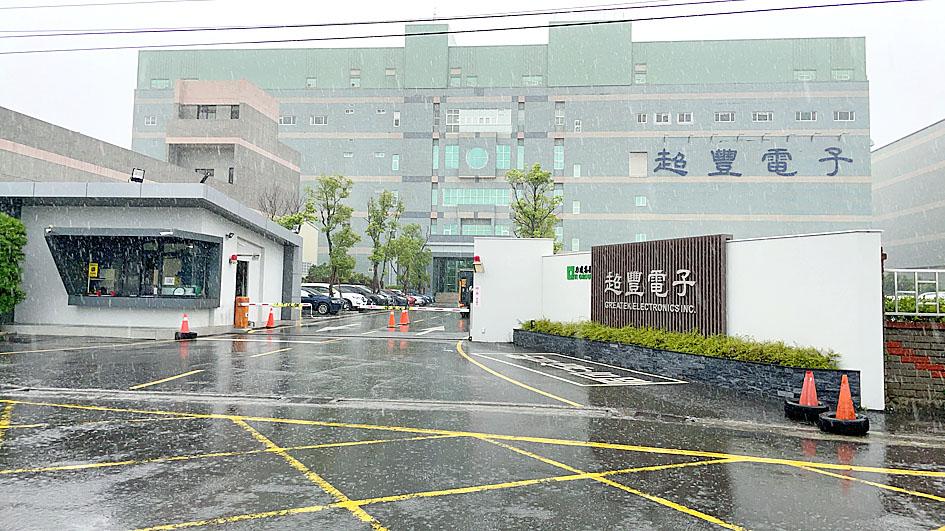Chip tester and packager Greatek Electronics Inc’s (超豐電子) shares tumbled more than 3 percent yesterday, as it said it expected output to drop by about 10 percent this month because it has shut some production lines to test all employees for COVID-19 after reporting eight confirmed cases.
A Philippine worker contracted COVID-19 on Tuesday last week, and eight other migrant workers — the first worker’s roommates — were confirmed to have the virus the next day, the firm said in a statement.
Greatek was one of five electronics companies in Miaoli County’s Jhunan Township (竹南) that reported COVID-19 infections among migrant workers.

Photo: Tsai Cheng-min, Taipei Times
To prevent the virus from spreading, Greatek decided to test all of its 4,264 employees, including Taiwanese employees, and test 208 high-risk workers using polymerase chain reaction tests, it said.
It took three days through Monday to complete the tests, resulting in the partial shutdown of production lines, the company said, adding that four more employees tested positive for COVID-19.
“The company has suspended production partially due to the rapid screening tests. The workforce has been reduced as some employees were isolated,” the statement said. “That will cut output by about 10 percent in June.”
The company aims to boost production and enhance operational efficiency to recover the output loss later this year after the COVID-19 outbreak is brought under control, it said.
Shares of Greatek dropped 3.13 percent to NT$71.2 yesterday, underperforming the TAIEX’s loss of 0.64 percent.
To prevent further infections among migrant workers from crippling production of local technology firms and to protect people living in the surrounding areas, the Ministry of Science and Technology has launched rapid screening test centers at the nation’s three major science parks.
Two new rapid screening test centers were yesterday launched at the Southern Taiwan Science Park’s (南部科學園區) two campuses in Tainan and Kaohsiung.
The rapid screening test centers can so far test a combined 1,000 people a day, the Southern Taiwan Science Park Administration said in a statement yesterday.
Firms at the Southern Taiwan Science Park employ 7,865 blue-collar migrant workers and 160 foreign employees in managerial positions, the administration said.
Rapid screening test centers were launched at the Hsinchu Science Park (新竹科學園區) and the Central Taiwan Science Park (中部科學園區) on Sunday and Tuesday respectively.
Networking equipment maker Accton Technology Corp (智邦科技) is to test more than 1,740 employees from Jhunan Township, the company said in a statement.
As of Tuesday, 13 of its employees had tested positive for COVID-19, Accton said.

CHIP RACE: Three years of overbroad export controls drove foreign competitors to pursue their own AI chips, and ‘cost US taxpayers billions of dollars,’ Nvidia said China has figured out the US strategy for allowing it to buy Nvidia Corp’s H200s and is rejecting the artificial intelligence (AI) chip in favor of domestically developed semiconductors, White House AI adviser David Sacks said, citing news reports. US President Donald Trump on Monday said that he would allow shipments of Nvidia’s H200 chips to China, part of an administration effort backed by Sacks to challenge Chinese tech champions such as Huawei Technologies Co (華為) by bringing US competition to their home market. On Friday, Sacks signaled that he was uncertain about whether that approach would work. “They’re rejecting our chips,” Sacks

It is challenging to build infrastructure in much of Europe. Constrained budgets and polarized politics tend to undermine long-term projects, forcing officials to react to emergencies rather than plan for the future. Not in Austria. Today, the country is to officially open its Koralmbahn tunnel, the 5.9 billion euro (US$6.9 billion) centerpiece of a groundbreaking new railway that will eventually run from Poland’s Baltic coast to the Adriatic Sea, transforming travel within Austria and positioning the Alpine nation at the forefront of logistics in Europe. “It is Austria’s biggest socio-economic experiment in over a century,” said Eric Kirschner, an economist at Graz-based Joanneum

BUBBLE? Only a handful of companies are seeing rapid revenue growth and higher valuations, and it is not enough to call the AI trend a transformation, an analyst said Artificial intelligence (AI) is entering a more challenging phase next year as companies move beyond experimentation and begin demanding clear financial returns from a technology that has delivered big gains to only a small group of early adopters, PricewaterhouseCoopers (PwC) Taiwan said yesterday. Most organizations have been able to justify AI investments through cost recovery or modest efficiency gains, but few have achieved meaningful revenue growth or long-term competitive advantage, the consultancy said in its 2026 AI Business Predictions report. This growing performance gap is forcing executives to reconsider how AI is deployed across their organizations, it said. “Many companies

France is developing domestic production of electric vehicle (EV) batteries with an eye on industrial independence, but Asian experts are proving key in launching operations. In the Verkor factory outside the northern city of Dunkirk, which was inaugurated on Thursday, foreign specialists, notably from South Korea and Malaysia, are training the local staff. Verkor is the third battery gigafactory to open in northern France in a region that has become known as “Battery Valley.” At the Automotive Energy Supply Corp (AESC) factory near the city of Douai, where production has been under way for several months, Chinese engineers and technicians supervise French recruits. “They